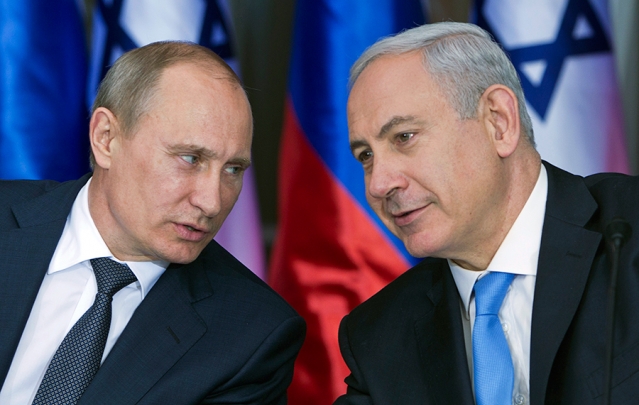Analysis/In Its Battle Against Iran, Israel Is Dependent on Russia’s Plans for Syria
زفي بارئيل من الهآرتس: إسرائيل في معركتها مع إيران هي تعتمد على خطط روسيا في سوريا
Zvi Bar’el/Haaretz/January 24/19
Officials in Washington, Jerusalem, Damascus and Tehran are all anxiously awaiting the meeting scheduled for Wednesday between Turkish President Recep Tayyip Erdogan and his Russian counterpart, Vladimir Putin. The intensive talks that U.S. President Donald Trump and his aides conducted this week with Erdogan and Ankara’s road map for resolving the question of control of the Kurdish areas will be the focus of the talks in Russia. But the latest skirmishes between Israel and Iranian forces and their missile exchange are also expected to be on the two leaders’ busy agenda.
Israel has recently benefited from a relatively free hand toward the Iranian forces operating in Syria. Trump gives his backing to Israel’s military activity as part of his joint strategy with Prime Minister Benjamin Netanyahu to minimize the Iranian presence in Syria, and even Russia responded rather meekly to the latest strikes. But the amount of leeway Israel can expect will depend not only on the upturn in Jerusalem’s relationship with Moscow, but also on Russia’s success in advancing its diplomatic program.
Israel has the upper hand militarily, as long as Russia neither applies the brakes nor aids Damascus with its advanced anti-aircraft missile systems in Syria, such as the S-300 and S-400. Without its own air power in Syria, Iran depends on the Syrian systems for its defense. For now, the missiles fired at Israel appear to have been a limited response that Iran presumably won’t want to expand, mainly due to fear that Israel could strike Syrian institutions, leading President Bashar Assad and Russia to treat Iran’s presence as a strategic risk.
At the same time, it is clear that airstrikes alone cannot drive out the Iranian forces. And if that is the goal, there’s no avoiding the kind of ground operation that Israel presumably doesn’t want to chance.
The upshot is that any Israeli military operation to eradicate the Iranian forces depends on Russia, which up to now has shown little interest or ability to influence Iran’s actions. Moscow hasn’t even been able to make good on its promise to move Iran’s forces away from the Israeli border.
According to public statements from Russia and Syria, the withdrawal of the foreign forces must be preceded by a comprehensive agreement on the structure of the new government in Syria; defense of the Syrian-Turkish border from Kurdish militias and militants from the outlawed Kurdistan Workers’ Party, or PKK; and on the roles of Russia, Turkey and Iran in stabilizing the new government in Damascus.
If and when such agreements are reached, Syria may request the withdrawal of all foreign forces, including those of Russia, Turkey and Iran, and to demand Russian and international guarantees to defend its sovereignty, including against Israeli attacks.
That scenario is a distant one. Ankara and Washington haven’t reached an agreement on the Kurds; Turkey refuses to accept the U.S. demand that it refrain from strikes in the northern Kurdish-populated areas east of the Euphrates River. The United States is prepared to pressure the Kurds to get rid of their heavy weapons, on condition that Turkey agrees to protect them. That formula is unacceptable to Ankara, which is aware that it can get more from Washington if Trump insists on withdrawing U.S. forces from Syria.
Russia is keen on seeing Assad resume full control of Syria. But for that to happen, Moscow and Damascus must retake the rebel enclaves in Idlib province. Ankara received a deadline extension from Russia to reach an agreement with the rebels, so far without success.
Iran has been forced into a minor role, mainly because the reimposition of sanctions has increased Russia’s economic leverage over Tehran. Moscow is unlikely to rush to Iran’s defense in Syria as long as the escalation with Israel doesn’t threaten Assad’s regime.
Israel might think that the warming relations among a number of Arab states – such as the United Arab Emirates and Bahrain, which reopened their embassies in Damascus, as well as Egypt’s support for Assad and Russia’s hopes to lend Arab and international legitimacy to Assad – may help in freezing out Iran. But that could turn out to be more of a wish than a diplomatic program.
Syria didn’t cut ties with Iran even when it was a member of the Arab League, and it doesn’t view the renewal of relations with Arab states as having to come at the price of its relationship with Iran. In fact, a continued Iranian presence in Syria could be a bargaining chip for Assad that will enable him to secure control over Lebanon as well. Israel would find it hard to counter the Iranian presence in Syria under such a scenario, and be forced to “settle for” limited tactical skirmishes.






















